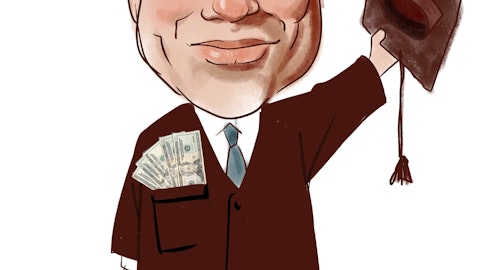As fund closures go, Fairholme Fund’s was relatively short. After closing its doors to new investors at the beginning of March, Fairholme officially reopened last week, offering new shares to all comers.
After such a quick about-face in fund policy, the natural question is why fund manager Bruce Berkowitz and the fund’s board of directors believed that reopening the fund made sense at this time. The answer could well hinge on Berkowitz’s willingness to make another big bet on a pair of stocks related to the financial industry.

Reading the tea leaves
In the press release reopening the fund, Fairholme said that it had an “expectation that, given the Fund’s current holding, investment opportunities, and liquidity, inflows from new investors can be invested in a manner that is consistent with the Fund’s investment objective and strategies.” That statement stands in contrast to Fairholme’s explanation for closing the fund earlier this year, when it said that “inflows from new investors into a Fund may dilute the proportionate interests of existing Fund shareholders in the Fund’s current portfolio holdings.”
Translated, those two statements suggest that earlier this year, Berkowitz didn’t have any compelling new investment ideas, but now, he does. Although Fairholme didn’t reveal which of its investment ideas it thinks are most compelling, recent actions suggest that Fannie Mae and Freddie Mac could be the fund’s expected destination for new cash.
Looking for the next score
Fairholme saw a huge defection of investors from its fund in 2011, when it posted abominable performance due to big bets on financial stocks that turned out to be short-term losers. Bank of America Corp (NYSE:BAC) ended up needing to ask Warren Buffett for a big infusion of capital, while insurance giant American International Group Inc (NYSE:AIG) took longer than expected to get its own asset sales and corporate restructuring done. Even though the fund rebounded sharply last year, its investors still withdrew billions of dollars, making its closure seem somewhat unnecessary. But what the closure did suggest was that Berkowitz no longer saw Bank of America Corp (NYSE:BAC) and American International Group Inc (NYSE:AIG) as a compelling source of strong future investment returns.
By contrast, since the closure, Fairholme has made several public moves with Fannie and Freddie. As Fairholme put it in its semiannual report, the fund sees the preferred shares of the two government-sponsored enterprises as “investments in the recovery of homeownership.” Given that a group of lawmakers in the U.S. Senate have presented bills to wind down both entities, potentially leaving shareholders with worthless stock, Berkowitz’s initial $2.4 billion stake in the entities definitely carries some risk.
Yet Fairholme has taken legal action in federal (OTCBB:FNMA) (OTCBB:FMCC) court, arguing that Fannie and Freddie are both earning profits now and repaying the money that the government used in its bailout of the mortgage entities during the financial crisis. The fund believes that last year’s change in priority rules — which allowed the government to treat money it received from the entities as payments of preferred dividends, rather than repayment of invested capital — improperly subordinated the property rights of Fairholme and other preferred-stock investors.
What’s next?
When Fairholme next releases its list of holdings in November, it’ll be interesting to see whether it boosts its interest in Fannie and Freddie. With the entities trading just above $1 per share, Berkowitz stands to make another big score if Fairholme can win its legal action. But as with his past investments, the Fannie and Freddie positions are high-risk plays that could once again show just how volatile a highly concentrated fund can be.
The article What Fairholme’s Reopening Means for These Stocks originally appeared on Fool.com.
Fool contributor Dan Caplinger owns shares of Fairholme and warrants on AIG and Bank of America Corp (NYSE:BAC). has no position in any stocks mentioned. You can follow him on Twitter @DanCaplinger. The Motley Fool recommends AIG and Bank of America. The Motley Fool owns shares of AIG and Bank of America and has the following options: long January 2014 $25 calls on AIG.
Copyright © 1995 – 2013 The Motley Fool, LLC. All rights reserved. The Motley Fool has a disclosure policy.





